Obama’s First Year in Office
• Grave Injustice of Guantánamo, Bagram, Secret Detention Remain
• Obama Indefinitely Holding 50 Guantánamo Detainees
• UN Report Blasts U.S. Over Rendition & Secret Detention Camps
• Excerpts from the United Nations Report Denouncing Rendition and Secret Detention
• CCR Asks Supreme Court to Give Canadian Rendition Victim Maher Arar His Day in Court
Grave Injustice of Guantánamo, Bagram,
Secret Detention Remain
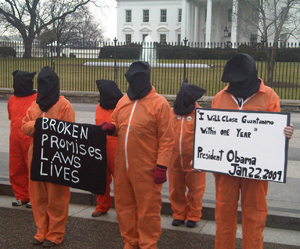 One of President Barack Obama’s first actions in office was to issue an executive order to close Guantánamo by January 22, 2010. He also established a task force at that time to review the people held in detention and determine whether they should be released or brought to trial, either in federal or military courts. The closing of Guantánamo was widely recognized as essential to restoring U.S. standing — worldwide and in the eyes of the American people. Guantánamo is recognized as the embodiment of torture and elimination of rights, including indefinite detention of hundreds of people without charges or trial. These decisions concerning Guantánamo also go to what Obama has called the “deficit of trust” in government, where the demands of the people in their majority are not met and government shows itself unable to provide solutions.
One of President Barack Obama’s first actions in office was to issue an executive order to close Guantánamo by January 22, 2010. He also established a task force at that time to review the people held in detention and determine whether they should be released or brought to trial, either in federal or military courts. The closing of Guantánamo was widely recognized as essential to restoring U.S. standing — worldwide and in the eyes of the American people. Guantánamo is recognized as the embodiment of torture and elimination of rights, including indefinite detention of hundreds of people without charges or trial. These decisions concerning Guantánamo also go to what Obama has called the “deficit of trust” in government, where the demands of the people in their majority are not met and government shows itself unable to provide solutions.
Obama missed his January 22, 2010 deadline to close Guantánamo. He instead used that date to announce that about 50 of the estimated 200 people still held there are considered by the president to be “too dangerous” to bring to trial or release. They are to be held indefinitely, without charges or trial, solely on the decision of the president that they are “too dangerous.” No information was provided concerning why they are “too dangerous” or what criteria were used to make the determination. Providing such information is also seen as “too dangerous” and a “threat to national security.” Obama’s administration had earlier admitted that “too dangerous” could mainly mean that bringing the person to trial would expose the torture used against the individual and/or expose U.S. intelligence operations, most of which are illegal. The individual themselves is likely guilty of nothing at all.
Obama came into office saying he would end torture and close Guantánamo and abide by the Geneva Conventions. These conventions call for prisoners captured in the course of war to have the opportunity to have their case heard by a neutral tribunal. Such a tribunal is to determine if they are or are not enemy combatants to be held as prisoners of war. As prisoners of war they have various rights, including treatment that is humane and not degrading or humiliating. Neither of these requirements is being met and Obama's announcements on January 22 did not speak to this failure.
It is estimated that 80 percent of people held at Guantánamo over the years were not even combatants, let alone illegal ones as the government contends. In the 35 habeas corpus cases that have made it to court, where people being held challenged their detention, federal courts have ordered the release of 29 people. The courts found that the government did not have sufficient evidence to hold them on any charge. Even so, Obama has refused to release 11 people, thus imposing executive power over the courts, also in the name of national security.
 Alongside the massive increase in troops and mercenaries in Afghanistan and extending the war to Pakistan, the prison camp at Bagram, in Afghanistan, has been expanded and many hundreds are being held there – also without charges or trials or designations as prisoners of war and the rights accorded by the Geneva Conventions. There are continuing reports of prisoner abuse including various forms of torture like sleep deprivation, exposure to freezing temperatures, severe beatings, and detainees being stripped and photographed naked. The administration has also so far attempted to block efforts by Bagram detainees to have their detention challenged, either in U.S. courts or before an international tribunal, as the Geneva Conventions require.
Alongside the massive increase in troops and mercenaries in Afghanistan and extending the war to Pakistan, the prison camp at Bagram, in Afghanistan, has been expanded and many hundreds are being held there – also without charges or trials or designations as prisoners of war and the rights accorded by the Geneva Conventions. There are continuing reports of prisoner abuse including various forms of torture like sleep deprivation, exposure to freezing temperatures, severe beatings, and detainees being stripped and photographed naked. The administration has also so far attempted to block efforts by Bagram detainees to have their detention challenged, either in U.S. courts or before an international tribunal, as the Geneva Conventions require.
In addition, just days after Obama announced that he would use secret evidence to keep 50 people in indefinite detention, the United Nations issued a report condemning the use of secret detention camps and rendition — where the U.S. kidnaps people in foreign countries, sneds them to secrete prisons scattered worldwide, often holding them incommunicado and commonly using torture or other “exceptional measures.” The United Nations report calls for “The status of all pending investigations into allegations of ill-treatment and torture of detainees and detainee deaths in custody must be made public. No evidence or information that has been obtained by torture or cruel, inhuman and degrading treatment may be used in any proceedings.” The report concluded, “International law clearly prohibits secret detention, which violates a number of human rights and humanitarian law norms that may not be derogated from under any circumstances. If secret detention constitutes enforced disappearances and is widely or systematically practiced, it may even amount to a crime against humanity.” The UN raised specific concerns about Bagram.
The 50 people Obama plans to keep in indefinite detention fall into this category requiring public information about both their charges and detention, as do those held by the U.S. at Bagram and worldwide. Instead, Obama is keeping the information secret, saying it is “too dangerous” to do otherwise. Obama is contending with the fact that in the eyes of the people, what is at stake are the principles reflected in law and achieved through great struggle and sacrifice. The principle barring torture under any circumstances, that humiliation and degrading treatment of prisoners is outlawed and all prisoners are to be treated with dignity, that conditions of war do not excuse secret prisons, rendition and arbitrary and indefinite detention. The increasing "deficit of trust" in government stems in part from this reality that the executive is positioning itself above the law, acting with impunity and generating an atmosphere of impunity against the people that is widely felt and opposed. Obama was elected in part to mend this "deficit of trust," but instead, a year later, has deepened it further. The failure to provide solutions on an issue Obama himself brought to the fore is also more sharply raising the need for new arrangements of governance — that can block torture and indefinite detention and impunity and do so by empowering the people themselves.
Their drive to have a real say was seen in demonstrations that took place all month in January, in Washington, DC, expressing the demands of the people to immediately close Guantánamo and that everyone held there be released or charged and brought to trial in the federal courts. The stand is one of principle, against torture and indefinite detention, wherever it is being done, at Bagram or any of the prison camps around the world under U.S. control. The demand is for all the rendition camps of the CIA or Pentagon or any other government agency or paid mercenaries to be closed and those responsible for torture punished.
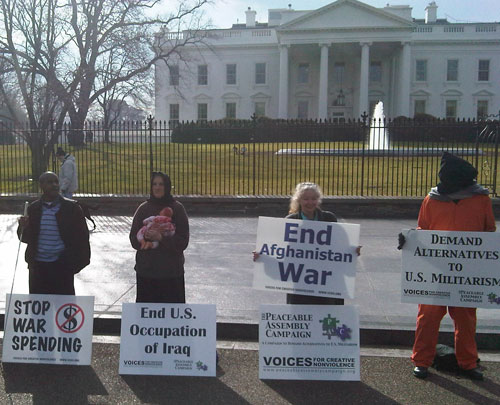
Executive Usurping Power
Obama was selected as president and emerged as champion of the ruling class in part because he was seen as the candidate who could restore legitimacy to the U.S. and U.S.-style democracy while still waging war. Part of his job as president is to continue to project U.S. military might while appearing to break from the Bush years, with its blatant disregard for international law. His first year demonstrates that U.S. military might is being extended, not only in Afghanistan and Pakistan but now to Haiti. And that the President, as Commander in Chief, is usurping yet greater powers in defiance of international and Constitutional laws.
The president, as Commander in Chief, during what is defined as permanent war, is invoking state secrets to justify the executive usurping power. Only he knows what threatens national security and thus only he can determine who is or is not dangerous. Using this justification, he has also refused to provide evidence about the 50 people branded as “too dangerous.” Similarly, the federal courts have ordered that specific evidence concerning torture be produced. Obama has refused, with one example being the photos of prisoners tortured by the U.S. in Iraq. He is doing this right at the time the UN report emphasizes that no emergencies or war conditions can justify such actions and specifically condemning the U.S. So the UN, as representative of international law, is also being defied. And the crimes of Guantánamo and indefinite detention remain.
Adding to the difficulties Obama faces is the fact that in addition to not closing Guantánamo, the government is now preparing to use the base for mass detention of Haitians. The world is already witness to the massive U.S. military response in Haiti, where the U.S. seized the airport and made certain priority was given to military needs. There are numerous examples of providing for troops while leaving Haitians without food and water; of civilian aid planes being blocked from landing or diverted and delayed; injured and sick people being blocked from coming to the U.S.
The Guantánamo Naval base has shelter, desalinization facilities to provide water, a hospital and airport to assist Haitians. Instead Haitians are being criminalized for striving to secure their safety in a situation where the U.S. bears main responsibility for their conditions of poverty in the first place. It is the U.S. that is the looter of Haitian wealth and resources and now striving to extinguish the resistance of the Haitians.
Further, Guantánamo itself belongs to the Cubans. Given that Cuba is sending doctors not soldiers and already supplying hundreds of doctors in Haiti, imagine if the resources of the base were in the hands of the Cubans to assist Haitians with medical care, shelter, water and so forth. Instead, the U.S. is again showing its double standards when it comes to justice. It is refusing to close Guantanamo, remove its troops and return the base to the Cubans. It is keeping people guilty of nothing in indefinite detention, now adding Haitians to the list. It is keeping the Cuban Five anti-terrorists in jail, while those responsible for torture and other crimes go unpunished.
Double standards, justifying indefenite detention, concentrating power in the executive so as to wreck rule of law, all are the mark of an undemocratic and unjust government, one no longer fit to govern. Obama’s first year, with its failures concerning Guantánamo and injustice, has brought this reality more sharply to the fore. People are increasingly drawing the conclusion that the old arrangements are outdated. The constitution, the courts and Congress, they are not blocking the crimes or defending rights. And clearly the direction of the ruling class to empower the executive to act with yet broader impunity, solves no problem. To end torture and all Guantánamos, what is needed are new arrangements of governance, where the people themselves govern and decide. This is the problem being taken up for solution.
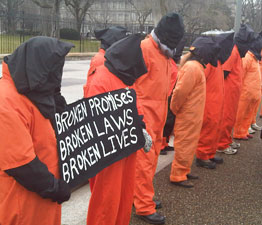
![]()

[TOP]
Obama Indefinitely Holding
50 Guantánamo Detainees
On January 22, 2010, the date President Barack Obama had set to close the Guantánamo prison camp, his administration instead announced that 50 people now held there will be held indefinitely, without trial or charges. Many have already been held without charges for 7-8 years. These 50 people have been designated as “too dangerous” to try or release. In determining that 50 people are “too dangerous” to release, the Obama administration also said the evidence against them is insufficient for a criminal trial.
The task force that announced the decisions was established by Obama his second day in office. It was led by the Justice Department (DoJ) and also included the Secretaries of Defense, State and Homeland Security; the Directors of National Intelligence and the CIA; and the chairman of the Joint Chiefs of Staff. The task force also determined that 35 of the people held at Guantánamo should be prosecuted in federal or military courts and at least 110 can be either immediately or eventually released. The DoJ will now determine which of the 35 will receive federal trials and the military is expected to use military courts to try the rest.
 The task force reports that the 50 being held indefinitely without trial or charges are being held under the “laws of war.” Commonly, the Geneva Conventions are what guides decisions concerning prisoners captured during war, their conditions of confinement, etc. But those at Guantánamo, from the beginning, have not been accorded the basic rights contained in the Geneva Conventions, including those barring torture and humiliating and degrading treatment. They also include the right of the individual to contest his detention before a neutral international tribunal, which is the body given authority to determine the person’s status as a prisoner of war. Instead, Bush, and now Obama, has vested such power in the U.S. president, made the determination on the basis of secret criteria and secret evidence, and now ruled that the detention is to be indefinite.
The task force reports that the 50 being held indefinitely without trial or charges are being held under the “laws of war.” Commonly, the Geneva Conventions are what guides decisions concerning prisoners captured during war, their conditions of confinement, etc. But those at Guantánamo, from the beginning, have not been accorded the basic rights contained in the Geneva Conventions, including those barring torture and humiliating and degrading treatment. They also include the right of the individual to contest his detention before a neutral international tribunal, which is the body given authority to determine the person’s status as a prisoner of war. Instead, Bush, and now Obama, has vested such power in the U.S. president, made the determination on the basis of secret criteria and secret evidence, and now ruled that the detention is to be indefinite.
In previous testimony, Attorney General Eric Holder has also made clear that the designation “too dangerous” can mean that the secret “evidence” is tainted because it was obtained through use of torture. A trial would expose the criminal torture as well as making the evidence inadmissible in court. He also said “too dangerous” may mean that a trial would reveal U.S. intelligence operations, also known to be illegal. In this manner, the executive is establishing that on the president’s say-so alone, an individual can be held indefinitely without trial and without being guilty of any crime. Or perhaps only being guilty of knowing of the government’s crimes. As executive director of the American Civil Liberties Union has put it, “There is no statutory regime in America that allows us to hold people without charge or trial indefinitely.”
The use of this conception that trials are “too dangerous” for the government also serves to further remove these matters of prisoners and their rights from the public arena and place it more under the personal purview of the president. In secret the executive branch makes determinations that enforce indefinite detention with no trial or charges. Then “national security,” also as determined by the executive, is used to say the secrets must be kept secret as they are “too dangerous” to reveal. This goes directly counter to standards of democracy, where individuals have rights and are protected from the arbitrary dictate of the executive. Indeed, the Constitution was meant to rein in the tyranny of the executive and is clearly failing to do so. It indicates that new arrangements that put rights front and center are the order of the day.
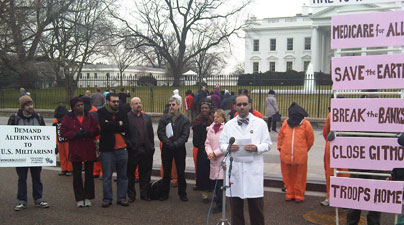
Obama did say that the 50 people could challenge their detention in federal court under habeas corpus. A habeas corpus trial is a civil case, which means the individual involved is not provided with a lawyer and must mount their legal case using their own resources. Many legal and rights advocates have come forward to pursue such cases for free and are responsible for the case that brought the 2008 Supreme Court ruling that upheld the right of people at Guantánamo to challenge their detention in court.
However, the executive has not submitted to the court findings in many of these cases. There have been 35 habeas corpus trials so far and in 29 of them the courts have ruled the government had insufficient evidence and ordered the person released. These results are indicative of the fact that 80 percent or more of people held at Guantanmo are guilty of nothing at all. In addition, in at least 11 cases, the government has refused to release the person and they remain at Guantánamo. And now, the Obama administration announced that of the 110 to be released, about 60 are from Yemen. While Yemen has agreed to take the people involved, the president has said no one will be released to Yemen until he determines that the country is “sufficiently stable.”
In this manner it can be seen that the president is refusing to submit to the courts and instead usurping the power to decide who is and is not dangerous, who is and is not to be indefinitely detained, regardless of court findings. And at any time he can determine that people from a particular country, or perhaps a particular group, or simply with views considered “too dangerous,” will not be released. Obama indicated this in his State of the Union speech when he said, “If you adhere to our common values you should be treated no different than anyone else.” The inference is that those who do not “adhere to common values” will be treated differently. Given the experience with Guantánamo, with the government labeling anti-war activists as “terrorists,” and now with the president deciding people can be detained indefinitely without trial or charges, it can be seen that executive power is being used to threaten the right to dissent and all those here and abroad who reject the values of the rich. It is dangerous indeed when the president decides what is and is not “dangerous” – what the common values are, and what different treatments should be meted out to those who do not share them.
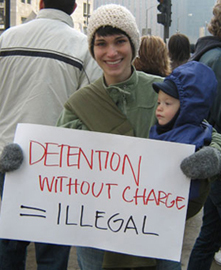
![]()
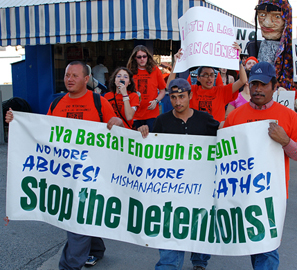
[TOP]
Abuses May Constitute Crime Against Humanity
UN Report Blasts U.S. Over Rendition & Secret Detention Camps
The United Nations Human Rights Council released a report documenting and denouncing secret detention and extraordinary rendition on January 26. The report denounced the U.S. in particular for its broad use of secret detention facilities and rendition, where people are kidnapped or captured in other countries by the U.S., then sent to secret camps to be detained and often tortured. Many people were held incommunicado for years, with no charges, no trial, no lawyers, not even Red Cross visits. The report provides information concerning how U.S. secret facilities were set up and run, including the various countries the U.S. utilized for such purposes.
The report spoke to current concerns that while the CIA may have closed some detention facilities, it still operated what are now termed “short-term facilities” serving the same purpose. As well, concern was raised that the military’s Joint Special Operations Command (JSOC) and its secret facilities did not come under executive orders by President Obama to close the CIA’s secret facilities. JSOC is notorious for its secret and illegal operations, especially in Pakistan and Afghanistan. General Stanley McChrystal, who headed it, is now in charge of the war against Afghanistan. Given this, concerns raised about the continuation of renditions and secret facilities where people are tortured are well founded.
As head of JSOC, McChrystal is the general who has been in charge of the torture and other secret and illegal military operations in Afghanistan and Pakistan known as “black ops.” It is also the case that as part of Guantánamo court cases, Obama was ordered to release photos of prisoner torture. After first saying he would release them, Obama then refused, invoking “national security.” Interestingly, he made this decision two days after appointing McChrystal to head the U.S. war against Afghanistan. Appointing McChrystal — the very embodiment of torture, assassinations, kidnappings, and drone attacks massacring civilians — while also invoking state secrets to justify further concentration of power in the hands of the president, are contributing to distrust in government and with Obama. What we see is a strengthening of executive dictate while international law, its institutions like the UN as well as the courts in the U.S. are being undermined. The actions are contrary to the demands of the poeple and contrary to rule of law.
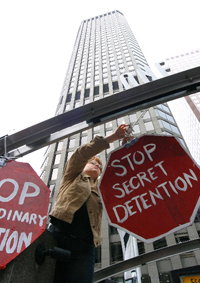 The report also said, “Secret detention as such may constitute torture or ill-treatment for the direct victims as well as their families. But as many of the interviews and cases included in the present study have illustrated, the very purpose of secret detention was to facilitate and, ultimately cover up torture and inhuman and degrading treatment used either to obtain information or to silence people. While in some cases, elaborate rules were put in place authorizing “enhanced” techniques that violate international standards of human rights and humanitarian law, most of the time secret detention was used as a kind of defense shield to avoid any scrutiny and control – and make it impossible to learn about treatment and conditions during detention.”
The report also said, “Secret detention as such may constitute torture or ill-treatment for the direct victims as well as their families. But as many of the interviews and cases included in the present study have illustrated, the very purpose of secret detention was to facilitate and, ultimately cover up torture and inhuman and degrading treatment used either to obtain information or to silence people. While in some cases, elaborate rules were put in place authorizing “enhanced” techniques that violate international standards of human rights and humanitarian law, most of the time secret detention was used as a kind of defense shield to avoid any scrutiny and control – and make it impossible to learn about treatment and conditions during detention.”
The UN report concluded, “International law clearly prohibits secret detention, which violates a number of human rights and humanitarian law norms that may not be derogated from under any circumstances. If secret detention constitutes enforced disappearances and is widely or systematically practiced, it may even amount to a crime against humanity.” It emphasized, “In spite of these unequivocal norms, secret detention continues to be used in the name of countering terrorism around the world.”
The report stressed that establishment of secret detention could not be justified under any circumstances, including during states of emergency or armed conflict. They specifically examined and condemned its use as part of the U.S. organized “war on terror.” They brought out that “The CIA appears to generally have been involved in the capture and transfer of prisoners, as well as in providing questions for those held in foreign prisons.” Other countries, such as Britain and Canada were also condemned for their complicity in the renditions and turning people over to torture.
The UN experts recommended that all such facilities be eliminated and specifically prohibited. The rights of all detainees are to be respected, including their right to challenge detention and not to be subjected to torture and degrading treatment of any kind. It said names should be handed over to the ICRC so that families can be notified and actions taken to assist and defend those imprisoned. The report also calls for reparations to be paid to all those imprisoned in such secret facilities and their families. It emphasized, “The status of all pending investigations into allegations of ill-treatment and torture of detainees and detainee deaths in custody must be made public. No evidence or information that has been obtained by torture or cruel, inhuman and degrading treatment may be used in any proceedings.”
The year-long study was conducted by the Special Rapporteur on Torture, the Working Group on Arbitrary Detention and the Working Group on Enforced or Involuntary Disappearances.
[TOP]
Excerpts from the United Nations Report
Denouncing Rendition and Secret Detention
In response to statements from President Barack Obama to the UN experts, where he states secret detention and rendition are to be ended, the United Nations report stated in part:
161.The Experts welcome these commitments. They believe however that clarification is required as to whether detainees were held in CIA “black sites” in Iraq and Afghanistan or elsewhere when President Obama took office, and, if so, what happened to the detainees who were held at that time. Also, the Experts are concerned that the Executive Order which instructed the CIA “to close any detention facilities that it currently operates” does not extend to the facilities where the CIA detains individuals on “a short-term transitory basis.” The Order also does not seem to extend to detention facilities operated by the Joint Special Operation Command.
162. The Experts also welcome in particular the new policy which was implemented in August 2009, under which the military must notify the International Committee of the Red Cross (ICRC) of the detainees’ names and identification number within two weeks of capture. Nevertheless, there is no legal justification for this two-week period of secret detention. According to the Third Geneva Convention, prisoners of war are to be documented, and their whereabouts and health conditions made available to family members and to the country of origin of the prisoner within one week. The Fourth Geneva Convention (governing the treatment of civilians) establishes virtually identical procedures for the documentation and disclosure of information concerning civilian detainees. Furthermore, it is obvious that this unacknowledged detention for one week can only be applied to persons that have been captured on the battlefield in a situation of armed conflict. This is an important remark, as the Experts noted with concern news reports which quoted current government officials saying that “the importance of Bagram as a holding site for terrorism suspects captured outside Afghanistan and Iraq has risen under the Obama administration, which barred the Central Intelligence Agency from using its secret prisons for long-term detention.”
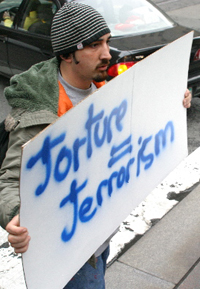 163. The situation at Bagram (the Bagram Theater Internment Facility) remains of great concern. In March 2009, US District Court Judge John D. Bates ruled that the habeas corpus rights granted to the Guantánamo detainees by the US Supreme Court in June 2008 extended to non-Afghan detainees who had been seized in other countries and rendered to Bagram, because “the detainees themselves as well as the rationale for detention are essentially the same”, and because the review process established at the prison “falls well short of what the Supreme Court found inadequate at Guantánamo.” The four petitioners were among the 94 prisoners that Assistant Attorney General Stephen G. Bradbury admitted were held in CIA custody between 2001 and 2005. Judge Bates found that, in holding detainees at Bagram not as prisoners of war, but as “unlawful enemy combatants,” the Bush administration had put in place a review process, the Unlawful Enemy Combatant Review Board (UECRB), in which “Detainees cannot even speak for themselves; they are only permitted to submit a written statement. But in submitting that statement, detainees do not know what evidence the United States relies upon to justify an ‘enemy combatant’ designation – so they lack a meaningful opportunity to rebut that evidence.”
163. The situation at Bagram (the Bagram Theater Internment Facility) remains of great concern. In March 2009, US District Court Judge John D. Bates ruled that the habeas corpus rights granted to the Guantánamo detainees by the US Supreme Court in June 2008 extended to non-Afghan detainees who had been seized in other countries and rendered to Bagram, because “the detainees themselves as well as the rationale for detention are essentially the same”, and because the review process established at the prison “falls well short of what the Supreme Court found inadequate at Guantánamo.” The four petitioners were among the 94 prisoners that Assistant Attorney General Stephen G. Bradbury admitted were held in CIA custody between 2001 and 2005. Judge Bates found that, in holding detainees at Bagram not as prisoners of war, but as “unlawful enemy combatants,” the Bush administration had put in place a review process, the Unlawful Enemy Combatant Review Board (UECRB), in which “Detainees cannot even speak for themselves; they are only permitted to submit a written statement. But in submitting that statement, detainees do not know what evidence the United States relies upon to justify an ‘enemy combatant’ designation – so they lack a meaningful opportunity to rebut that evidence.”
164. This ruling has been appealed by the current United States administration, even though Judge Bates conceded that habeas rights did not extend to Afghan detainees held at Bagram, nor to Afghans seized in other countries and rendered to Bagram. In its appeal against Judge Bates’ ruling, the United States administration notified the court that it was introducing a new review process at Bagram, “modifying the procedures for reviewing the status of aliens held by the Department of Defense at the Bagram Theater Internment Facility.” However, the Experts are concerned that the new review system fails to address the fact that detainees in an active war zone should be held according to the Geneva Conventions, screened close to the time and place of capture if there is any doubt about their status, and not be subjected to reviews at some point after their capture to determine whether they should continue to be held. The Experts are also concerned that the system appears to specifically aim to prevent U.S. courts from having access to foreign detainees captured in other countries and rendered to Bagram. While the Experts welcome that the names of 645 detainees at Bagram are now known, they urge the United States Government to provide information on the citizenship, length of detention and place of capture of all detainees currently held within Bagram Air Base. [...]
V. CONCLUSIONS
282. International law clearly prohibits secret detention, which violates a number of human rights and humanitarian law norms that may not be derogated from under any circumstances. If secret detention constitutes enforced disappearances and is widely or systematically practiced, it may even amount to a crime against humanity. […]
283. [Secret detention] effectively means taking detainees outside the legal framework and rendering meaningless safeguards contained in international instruments, most importantly habeas corpus. The most disturbing consequence of secret detention is, as many of the experts’ interlocutors pointed out, the complete arbitrariness of the situation, together with the uncertainty about the duration of the secret detention. […]
285. States of emergency, international wars and fights against terrorism – often framed in vaguely defined legal provisions – constitute an “enabling environment” for secret detention. As in the past, extraordinary powers are today conferred on authorities, including armed forces, law-enforcement bodies and/or intelligence agencies, under states of emergency or global war paradigms without or with very restricted control mechanisms by parliaments or judicial bodies. This thus renders ineffective many, or all, of the safeguards contained in criminal law and required by international human rights law. In some States, protracted states of emergency and broadly defined conflicts against vaguely conceived enemies, have tended to turn exceptional, temporary rules into the norm.
287. From the Condor Plan in South America [organized by the U.S. that killed or disappeared many thousands of people] through the global CIA network, secret detention has relied on systems of trans-border (regional or global) cooperation. This means that many times foreign security forces freely operate in the territory of other States. It also leads to the mutual exchange of intelligence information between States – followed by its use for the purpose of detaining or trying the person before tribunals the proceedings of which do not comply with international norms, often with reference to state secrets, making it impossible to verify how the information was obtained. A crucial element in international cooperation, be it within the Condor Plan methods of the 1970s or the current policies of “extraordinary renditions,” has been the transfer of alleged terrorists to other countries, where they may face a substantial risk of being subjected to torture and other cruel, inhuman and degrading treatment in contravention of the principle of non-refoulement [referring to the principle in international law that protects refugees from being returned to places where their lives or freedoms could be threatened]. Worse, in some cases, persons have been rendered to other countries, precisely to circumvent the prohibition of torture. […]
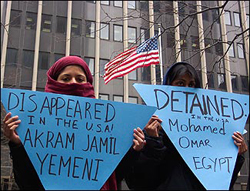 290. The generalized fear of secret detention and its corollaries such as torture and ill-treatment tend to effectively result in limiting the exercise of a large number of human rights and fundamental freedoms. These include freedom of expression and freedom of association, as they often go hand in hand with intimidation of witnesses, victims and their families. Moreover, independent judiciaries and secret detention can hardly co-exist – several examples identified by the experts indicate that the broader use of secret detention tends to lead to attempts to either influence or, worse, silence judges who take up cases of secret detention. […]
290. The generalized fear of secret detention and its corollaries such as torture and ill-treatment tend to effectively result in limiting the exercise of a large number of human rights and fundamental freedoms. These include freedom of expression and freedom of association, as they often go hand in hand with intimidation of witnesses, victims and their families. Moreover, independent judiciaries and secret detention can hardly co-exist – several examples identified by the experts indicate that the broader use of secret detention tends to lead to attempts to either influence or, worse, silence judges who take up cases of secret detention. […]
Recommendations
292.On the basis of these conclusions, the Experts put forward the following recommendations. In practice, concrete measures will need to be taken depending on the specific contexts.
a) Secret detention should be explicitly prohibited, along with all other forms of unofficial detention. Detention records should be kept (including in times of armed conflict as required by the Geneva Conventions, including the number of detainees, their nationality, and the legal basis on which they are being held, whether as prisoners of war or civilian internees). Internal inspections as well as independent mechanisms should have timely access to all places where persons are deprived of their liberty for monitoring purposes at all times. In times of armed conflict, the location of all detention facilities should be disclosed to the International Committee of the Red Cross.
b) Safeguards for persons deprived of the ir liberty should be fully respected. No undue restrictions on these safeguards under counter-terrorism or emergency legislation are permissible. In particular, effective habeas corpus reviews by independent judicial bodies are central to ensuring respect for the right to personal liberty. Therefore domestic legislative frameworks should not allow for any exceptions from habeas corpus, operating independently from the detaining authority and from the place and form of deprivation of liberty. The study has shown that judicial bodies play a crucial role in protecting people against secret detention. The law should foresee penalties for officials who refuse to disclose relevant information during habeas corpus proceedings. […]
h) Victims of secret detention should be provided with judicial remedies and reparation in accordance with relevant international norms. These international standards recognize the right of victims to adequate, effective and prompt reparation, which should be proportionate to the gravity of the violations and the harm suffered. As families of disappeared persons have been recognized as victims under international law, they should also benefit from rehabilitation and compensation.
(All paragraph numbers refer to those in the UN report, which can be downloaded at un.org.)
[TOP]
CCR Asks Supreme Court to Give Canadian Rendition Victim Maher Arar His Day in Court
On February 1, 2010, the Center for Constitutional Rights (CCR) asked the United States Supreme Court to take up the case of Canadian citizen Maher Arar against U.S. officials. The U.S. sent Arar to Syria to be interrogated under torture and arbitrarily detained for a year. Lower courts concluded that Mr. Arar’s suit could not proceed because it raised sensitive foreign policy and secrecy issues. If the Court of Appeals’ ruling is allowed to stand, the federal officials involved will effectively be immunized from any civil legal accountability for what they did to an innocent man.
Maher Arar is not available to comment in person, but is issuing the following statement: “With renewed hope I am asking the Supreme Court of the United States to hear my plight and eventually overturn the lower courts’ rulings, which essentially gave the government the green light to continue the abuse of its executive powers in matters related to National Security.”
CCR attorneys say the Supreme Court should hear the case because the Court of Appeals’ decision not only contradicts Supreme Court decisions but also raises issues of national importance by effectively immunizing federal officials who conspired to subject Arar to torture, and to block his access to a court that almost certainly would have barred the federal officials from carrying out their illegal plan.
Because the case was fully briefed and argued before President Obama took office, his administration has not yet had to take a position on Mr. Arar’s case, but is expected to do so in response to Mr. Arar’s petition.
CCR cooperating attorney David Cole, who argued Arar’s case in the lower courts said, “The courts below ruled that federal officials cannot be sued for sending an innocent man to Syria to be tortured because the case would be too sensitive – even though Congress has declared that courts are fully competent to assess claims that the United States is sending non-citizens to countries where they face a risk of torture. We hope the Supreme Court will reaffirm the role of checks and balances and afford Mr. Arar his day in court.”
Mr. Arar alleges that the U.S. officials named in the suit conspired with Syrian officials to have him tortured in Syria, delivered him to his torturers, provided them with a dossier on him and questions to ask him, and then obtained the answers tortured out of him. The legal arguments in the case revolve around whether U.S. officials can be sued for damages if that is the only remedy available to the victim, and whether Mr. Arar has a right to pursue his claims under the Torture Victim Protection Act, among others.
“Thus far the United States courts have let Maher Arar down,” said CCR Senior Attorney Maria LaHood. “Today we ask the justices of the Supreme Court to consider Maher’s case and show the world that the Judiciary in this country is not broken, and that it can and will declare that the men who delivered Maher to torture and prevented him from going to court to stop them do not get a free pass just because they worked for the U.S. government.”
Background
Mr. Arar, a Syrian-born Canadian citizen, was detained at JFK Airport in September 2002 while changing planes on his way home to Canada. The Bush administration labeled him a member of Al Qaeda and sent him not to Canada, his home and country of citizenship, but against his will to Syrian intelligence authorities renowned for torture. He was tortured, interrogated and detained in a tiny underground cell for nearly a year before the Syrian government released him, stating they had found no connection to any criminal or terrorist organization or activity.
In January 2004, just three months after he returned home to Canada from his ordeal, CCR filed a suit on Mr. Arar’s behalf against John Ashcroft and other U.S. officials, the first to challenge the government’s policy of “extraordinary rendition,” also known as “outsourcing torture.”[…] Both the Executive and Judicial branches of the United States government have barred inquiry and refused to hold anyone accountable for ruining the life of an innocent man.
Two Congressional hearings in October 2007 dealt with his case. On October 18, 2007 Mr. Arar testified via video at a House Joint Committee Hearing convened to discuss his rendition by the U.S. to Syria for interrogation under torture. During that hearing – the first time Mr. Arar testified before any U.S. governmental body – individual members of Congress publicly apologized to him, though the government still has not issued a formal apology. The next week, on October 24, Secretary of State Condoleezza Rice admitted during a House Foreign Affairs Committee Hearing that the U.S. government mishandled his case.
The Court of Appeals case was heard a second time in December 2008 before twelve Second Circuit judges after a rare decision in August 2008 to rehear the case sua sponte, that is, of their own accord before Mr. Arar had even sought rehearing. On November 2, 2009, the Second Circuit Court of Appeals en banc affirmed the district court’s decision dismissing the case.
In a strongly worded dissent, Judge Guido Calabresi wrote, “I believe that when the history of this distinguished court is written, today’s majority decision will be viewed with dismay.”
[TOP]
